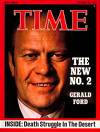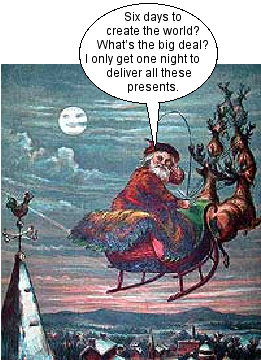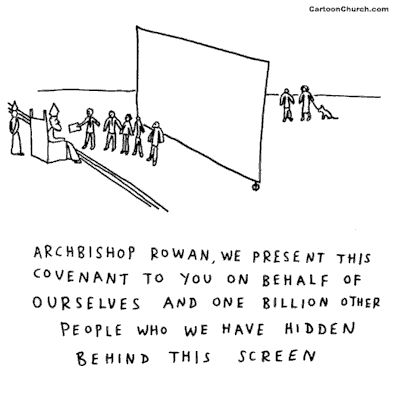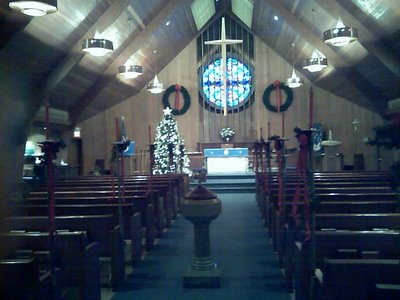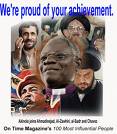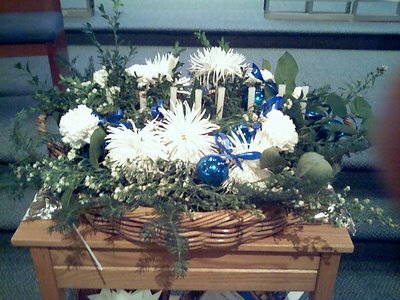
The first-ever Blue Christmas Service at The Episcopal Church of St. Paul was, indeed, a most holy night. Only 10 people came, but two of them were not members of the church and one was a member who had not attended church in over a year.
Everyone stayed after the 40 minute service, and we ate homemade braided bread filled with preserves made by Betty Gallagher, Bishop Carol Gallagher's mom who gave it to me two years ago when my daughter was seriously ill. She said it was a "Jar of Love."
Indeed, it was.
The silence in the church was not just the absence of sound but the fullness of a shared experience of loss and longing for hope and light.
I especially loved the sound of our voices as we sang, "O come, O come Emmanuel" - a response to the bidding prayers, as one by one, the candles in the Yule Log were lit. You can see that eight-candle Yule Log below.

I apologize for the quality of the pictures - I took them with my cell phone - not the best, but you get the idea.
I am appending the entire liturgy below. Take what you want or need that might be helpful to you and adapt it as necessary or appropriate to your need.
While credit is given where credit is due, I do not believe that there is an exclusive ownership of the liturgy. It's a work of the people of God to honor and worship God.
I believe this will become a lasting tradition at St. Paul's. I commend this wonderful ministry to you. Thank you all for your prayers. In my moments of anxiety (especially during the long moments of silence), it gave me strength and confidence as I felt lifted and held before God.
A Blue Christmas SERVICE
The Episcopal Church of St. Paul Chatham, NJ
December 23, 2006 four o'clock in the afternoonTHE GATHERING OF THE PEOPLEMusical preludeWords of Welcome Welcome to this Blue Christmas, a time when we can, with others, acknowledge the "blue" feelings we have at Christmas time, the reasons for them, and offer them to God. This time has been called the "long dark night of the soul" and "the winter of our discontent" in which memories of past experiences and the pain of present experiences can become overwhelming. For some, Christmas Day is the most difficult. For others, Christmas Eve, or New Years Eve, or the beginning of another lonely New Year. In this service, we'll have some singing appropriate to the Christmas Season, recognizing that this is not a season of joy for everyone. We will invite you to reflect on the pain, the loneliness, and the sadness you may feel and offer it to God for healing and transformation. We pray that you will find hope and comfort in knowing that you are not alone. Always remember that God knows your pain and loves you unconditionally. One: +For you, O God, our souls in silence wait.
All: Truly our hope is in you.Opening Prayer One: God of abundant mercy, you have given us grace to pray with one heart and one voice, even though our hearts are broken and our voices tremble with grief and sorrow. Comfort, comfort, Lord, your Holy people. Comfort those of us who sit in darkness, mourning 'neath our sorrow'ss load. Speak to us of the peace that awaits us, of the balm of healing for our weary and wounded souls. We ask all this, trusting in the promise you have made to hear the prayers of two or three who have gathered in the Name of your Holy Child, Jesus.
All: Amen. Hymn# 79: "O Little Town of Bethlehem" verses 1 & 2 THE PROCLAMATION OF GOD'S WORDA reading from Hebrew Scripture: Selected verses from Isaiah 40 "Comfort, comfort my people" says your God. "Speak to the heart of Jerusalem and call to her that the time of service is ended ... Look up to the heavens! Who made the stars, if not the One who drills them like an army, calling each one by its own name? So mighty is God's power and strength that not one fails to answer. Israel, why then do you complain that our God does not know your troubles or care if you suffer injustice? Our God, the everlasting God, the creator of the farthest parts of the each, never grows tired or weary. No one can fathom the depths of God's understanding. God gives power to the faint and strength to the powerless. They that wait upon the Lord shall renew their strength."
Hymn# 79: O Little Town of Bethlehem, vs. 3 & 4A Reading from the Psalms: Psalm 22 as follows ONE: My God, my God, why have you forsaken me? Why are you so far from helping me, so far from the words of my groaning?
ALL: O my God, I cry by day, but you do not answer; and by night, but I find no rest.
ONE: In you, our ancestors trusted. They trusted and you delivered them.
ALL: It was you who took me from the womb, you who kept me safe upon my mother's breast; since my mother bore me, you have been my God.
ONE: Do not be far from me, for trouble is near and there is no one to help.
ALL: God does not despise the affliction of the afflicted; God does not hide from me. When I cry to God, God hears me. Thanks be to God!
A Gospel Reading: Matthew 11:28-29 "Come to me, all you who are weary and carrying heavy burdens, and I will give you rest. Take my yoke upon you, and learn from me; for I am gentle and humble in heart, and you will find rest for you souls. For my yoke is easy and my burden is light."
Hymn# 79 - O Little Town of Bethlehem, vs. 5There follows a time for silent reflection. During this time, baskets with pencils and The Christmas Stars of Remembrance; are distributed. You are invited to print the name(s) of those who have died or those with whom you are no longer in relationship whom you would like to be remembered this Christmas. They will be gathered in a basket and placed near the candles for blessing.CANDLE LIGHTING LITANY OF REMEMBRANCE Reader: God who is with us, in this season of looking forward; of anticipating the celebration of your Son's birth and return in glory; we often find ourselves uncomfortable, uneasy, worried and sad. The lights and gaiety, the music, the bright joy around us, often make us more unquiet, more out of step, feeling even more disconnected and different.
All: Come, holy Child of BethlehemReader: Some of these feelings come from false expectations. Others come from real situations and issues that face us or those we love. Some are from events we may influence and some are beyond our control. Trusting in your grace and provision, we name these situations and face the pain and dislocation they cause us. We claim your promise to companion us in bearing them. We claim your steadfast love for us, knowing you will help us find peace for our troubled spirits. We claim your wise and merciful power, that you will meet each need as is best for us. (Silent reflection follows)
All: Hymn # 56: O come, o come Emmanuel, vs. 1Reader: God of Light and Life, we light this candle for all those who are struggling with issues involving physical or mental health. We especially remember those struggling with cancer, depression, or thoughts of suicide. May its light remind us all of the healing available to us in Christ Jesus. Hear our prayers that anguish be minimized and your good plan fulfilled for each who suffer. (Silent reflection follows)
All: Hymn # 56: O come, o come Emmanuel, vs. 2Reader: We light this candle for all those who are struggling with issues involving financial concerns, job loss, seemingly insurmountable debt. May its light remind us all that you are the Great Provider, you will give us our daily bread. Empower us to take the steps we need to solve these problems. Draw us to the right people and programs to help us. (Silent reflection follows)
All: Hymn # 56: O come, o come Emmanuel, vs. 3Reader: We light this candle for all those who grieve. You know our deepest need, you understand our pain- lost dreams, lost opportunities, the separation of death. May its light remind us that we are not orphaned, we are not alone. Grant us grace that in pain we may find comfort, in sorrow hope, and in death resurrection. (Silent reflection follows)
All: Hymn # 56: O come, o come Emmanuel, vs. 4Reader: We light this candle for all those who wrestle with the chains of addiction. Help us to name that which enslaves us and face it: food, alcohol, drugs, pornography, shopping, escapism, self medication, and self abuse in all its forms. May this candle bring your light to those secret, and not so secret, activities of imprisonment. Hear our prayers for deliverance and freedom; help us and those we love break the hold of these evils. (Silent reflection follows)
All: Hymn # 56: O come, o come Emmanuel, vs. 5Reader: We light this candle for all those who are victims of violence in any of its forms. May its light lead us to peace, safety, and truth. Pour forth encouragement to claim your help in healing physically and spiritually, to trust in your justice, to find assistance, to resist blaming ourselves, to be confident in the future you have planned for us, a future full of hope. (Silent reflection follows)
All: Hymn # 56: O come, o come Emmanuel, vs. 6Reader: We light this candle for all those who are experiencing the pain of broken relationships with family, children, spouses, and friends. May its light remind us of the pure communion you desire for all your creation. Our desire for this same communion makes estrangement so painful. Lead us to relinquish the hold broken relationships have on us, to forgive ourselves for our contribution to the breach, to forgive those who have hurt us, to take the steps to mend that relationship, if possible. Lord, we know that sometimes we suffer from a broken relationship with someone who is now dead. Help us to prayerfully examine, receive and extend forgiveness in that situation, that we may live again. (Silent reflection follows)
All: Hymn 56: O come, o come Emmanuel, vs. 7Reader: We light this candle for all those who are suffering the consequences of war, famine and unbridled disease. May its light remind us of your holy calling to every one who believes you are the light of the world. Change the hearts of all who resort to violence, who seek revenge. Protect those who find themselves far from home serving their nations or the needy. We know you are in the midst of those in anguish and pray that your healing presence will be seen, felt, and embraced. Reveal to us how to join in your saving work- to make tangible gifts to alleviate suffering, to support those on the front lines of natural and manmade disasters, to pray unceasingly for peace in our families, our neighborhoods, our world. (Silent reflection follows)
All: Hymn # 56: O come, O come Emmanuel, vs. 8Reader: We light this candle for all those who are estranged from you, who are besieged with doubts, who are overwhelmed by the world and do not claim your presence in their lives. We pray for them, and therefore ourselves, for we confess that each of us knows this condition. Lord, may the light of your love lead us all home to you. (Silent reflection follows)
We ask all these things in the strong name of Jesus.
Amen.We will now gather around the candles, forming a circle and holding hands as together, we sayOur father/mother, who art in heaven . . . ...Hymn #111: "Silent Night" The Blessing: My friends, life is short, and we do not have much time to gladden the hearts of those who make this earthly pilgrimage with us, so be swift to love, and make haste to do kindness, and the blessing of God, who comes to us as +Creative Presence, Saving Grace and Lifegiving Spirit be upon you and all whom you love and pray for this day, and forever more.
All: Amen.Dismissal: One: Let us bless the Lord
All: Thanks be to God As you leave the sanctuary, you are invited to come and pick up your Christmas Star of Remembrance and hang it on the Crismon Tree.
Light refreshments will be served in the foyer. Please come and stay for the solace known to those who gather in the name and community of Christ Jesus.
This service is a compilation of prayers and litanies from various sources arranged by the rector and pastor of St. Paul's Church, the Rev'd Elizabeth Kaeton, who is deeply grateful for the work of the Rev'd Jane Maffin, Anglican priest in the Church of Ottawa, and Jeanine Locicero, an Episcopalian who earns a living as Director of Worship Arts and Youth, Allendale United Methodist Church, Saint Petersburg, FL
Please feel free to share or adapt this liturgy with others who may be comforted.



 I have been reflecting on the deaths of three famous men over the past few days: James Brown, Gerald Ford, and Saddam Hussein.
I have been reflecting on the deaths of three famous men over the past few days: James Brown, Gerald Ford, and Saddam Hussein. 
